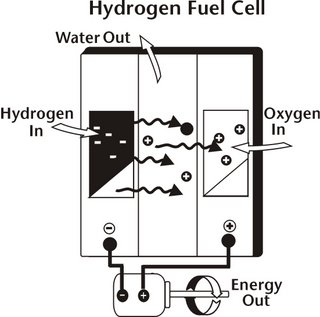
When the most important energy discussions are heading out towards figuring out how to get out of the carbon energy market and into the hydrogen energy market, we find that the PM of Australia is longingly wanting to become a giant of Carbon energy exports.
The Prime Minister's vision would see Australia dramatically increase its share of the world's market, taking advantage of growing international insecurity about energy and soaring prices.
He said Australia's energy exports were forecast to grow to around $45 billion in 2006-07, more than three times what was earned last year from meat, grains and wool combined.
"As an efficient, reliable supplier, Australia has a massive opportunity to increase its share of global energy trade," he told a Committee for Economic Development of Australia lunch in Sydney.
In a long speech that also called for greater national water reform and more water recycling, Mr Howard gave a nod to fossil fuels' contribution to rising global temperatures and changing weather. But he continued to reject both the Kyoto Protocol and carbon emissions trading or a carbon price as a way of dealing with climate change, preferring instead to rely on as yet commercially unproven carbon capture and storage technology.
"The Government's energy policy framework unapologetically emphasises the role of new low-emission technologies to deliver a sustainable greenhouse outcome and it unapologetically seeks to preserve the economic value of our energy resources at a time of soaring global demand," he said.
Opposition and green groups said Mr Howard's promises were illusory because his vision took no account of the rising economic and environmental damage posed by climate change.
"There is a limited 'golden age' to send Australian minerals out the door," said a Greenpeace energy campaigner, Catherine Fitzpatrick.
"If we continue along this path [of heavy reliance on fossil fuels] we will have a cataclysmic climate outcome," she said, adding that so-called low-emission technologies would use a large amount of energy to "clean" the dirty energy generated by coal.
The Labor spokesman on the environment, Anthony Albanese, said greenhouse gas emissions would not fall without market-based mechanisms that would put a price on carbon.
"If the Prime Minister was serious [about climate change] he would follow the lead of the Australian Business Roundtable on Climate Change, which showed the longer we delay action the greater the cost to the economy," he said. "There is no recognition [in the speech] that we live in a carbon-constrained world … it's just business as usual."

At least the Opposition parties get it. The energy issue is many-tiered so it's not universally bad to develop some capacity for fossil fuels on the proviso that it is used to extend our future technologies into the hydrogen fuel economy. Even so, we don't get that feeling from the PM's speech and there's the rub. He's talking about nuclear fission as a fuel we must embrace. Again, that's a little scary too. The problems of nuclear fission technology lie not so much in the technology itself but the need for constant human supervision; and so it fails when the human operators fail. History strongly suggests humans fail at some point - and the consequences of that are a lot more frightening with good reason.

The other obvious problem with the energy superpower concept is that you don't see Saudi Arabia and Iraq having become 'energy superpowers' based on their export of oil over all these years. The oil wealth only created a rich few and the populations of those countries are not exactly well-off as a result. Ditto for most other energy exporters, Rather, the track record indicates that all this will do will make a select few rich before the whole carbon energy system comes tumbling down. It's nothing to aim for given the resouces we've got.

No comments:
Post a Comment